13 Best Herbal Teas For Arthritis
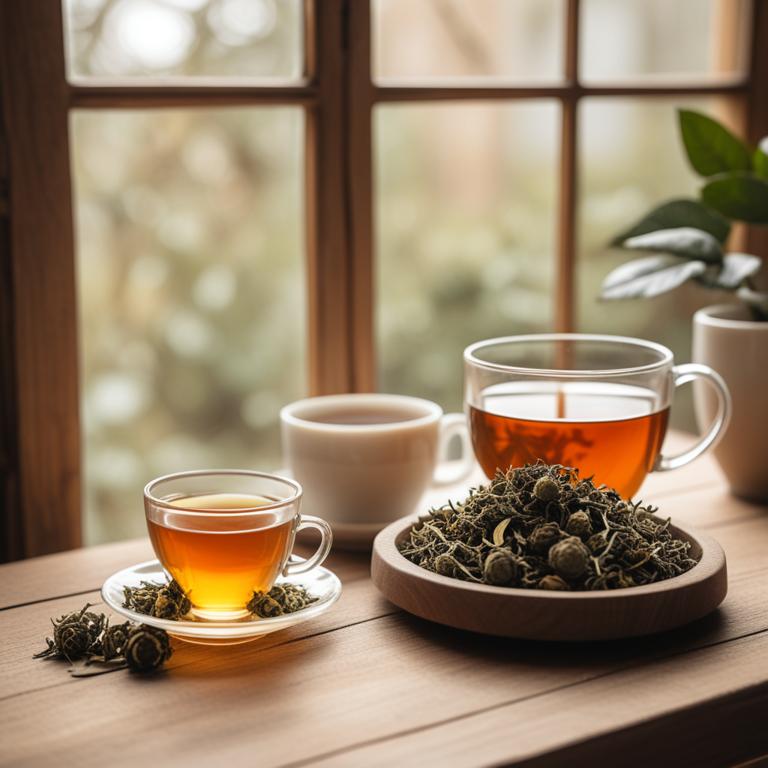
Herbal teas for Arthritis are a type of natural remedy that uses plant-based ingredients to alleviate the symptoms of arthritis, a chronic condition characterized by joint pain and inflammation.
Herbal teas can treat this ailment by reducing inflammation, soothing joint pain, and improving overall joint health due to their anti-inflammatory and antioxidant properties.
Some examples of herbal teas that can be used to treat arthritis include ginger tea, which has anti-inflammatory compounds that reduce joint pain and swelling, turmeric tea, which contains curcumin that reduces inflammation and improves joint mobility, willow bark tea, which has salicin that acts as a natural pain reliever, and peppermint tea, which has anti-inflammatory and antioxidant properties that soothe joint pain and improve joint function.
Additionally, other herbal teas such as rosehip tea, which is rich in vitamins and antioxidants that promote joint health, and licorice root tea, which has anti-inflammatory compounds that reduce joint pain and swelling, can also be used to treat arthritis.
Related Study
According to the study, teas for arthritis, specifically green tea, may be effective in providing pain relief due to its antioxidant and anti-inflammatory properties, particularly from the component Epigallocatechin-3-gallate (EGCG).
Below there's a list of the 13 best herbal teas for arthritis.
Table of Contents
- 1. Zingiber officinale teas
- 2. Curcuma longa teas
- 3. Glycyrrhiza glabra teas
- 4. Ginkgo biloba teas
- 5. Cinchona officinalis teas
- 6. Equisetum arvense teas
- 7. Rheum rhabarbarum teas
- 8. Achillea millefolium teas
- 9. Capsicum annuum teas
- 10. Camellia sinensis teas
- 11. Boswellia serrata teas
- 12. Salix alba teas
- 13. Hypericum perforatum teas
Also, you may be interested in...
Today Free Bonus!
The Ultimate Herb Drying Checklist
(For Long-Lasting Powerful Medicinal Effect)
How to easily dry herbs that don't mold and that keep their strong medicinal power for more than 1 year.
1. Zingiber officinale teas

Zingiber officinale teas, derived from the rhizome of the ginger plant, have been traditionally used to treat arthritis due to their anti-inflammatory and antioxidant properties.
The bioactive constituents present in these teas, including gingerols and shogaols, help to reduce pain and inflammation by inhibiting the production of pro-inflammatory enzymes and cytokines.
These compounds also exhibit analgesic and anti-arthritic properties, which contribute to the relief of joint pain and stiffness associated with arthritis.
Regular consumption of Zingiber officinale teas has been shown to provide benefits in managing arthritis symptoms, including reduced pain, improved joint mobility, and enhanced overall quality of life.
Related Study
According to the study, Zingiber officinale teas for arthritis may have therapeutic benefits due to their anti-inflammatory and analgesic activities, particularly helpful in treating osteoarthritis (OA) and rheumatoid arthritis (RA).
Recipe:
- Gather 1 cup of fresh Zingiber officinale (ginger) roots and 2 cups of water.
- Peel and slice the ginger into thin pieces. Use 1 tablespoon of sliced ginger for every cup of water.
- Boil the water in a pot and add the sliced ginger. Reduce heat and let it simmer for 5-7 minutes.
- Strain the tea into a cup using a cheesecloth or a fine-mesh sieve. Discard the ginger pieces.
- Drink 1 cup of the tea 2-3 times a day to help with arthritis symptoms. You can add honey or lemon to taste.
Zingiber officinale teas can be beneficial in treating arthritis symptoms due to its anti-inflammatory properties, but it may also cause side effects such as dizziness, nausea, and stomach upset in some individuals.
To minimize potential side effects, it's essential to drink Zingiber officinale teas in moderation, ideally after meals, and to avoid excessive consumption, especially for people with pre-existing digestive issues or those taking blood thinners.
Zingiber Officinale Tea on Amazon
FGO Organic Ginger Tea, 100 Count, Eco-Conscious Tea Bags, Caffeine Free, Packaging May Vary (Pack of 1)
Disclaimer: We earn a commission if you click this link and make a purchase at no additional cost to you.
2. Curcuma longa teas

Curcuma longa teas have been widely studied for their potential in treating arthritis, a condition characterized by joint inflammation and pain.
The anti-inflammatory and antioxidant properties of this herbal preparation help to reduce the symptoms of arthritis by inhibiting the production of pro-inflammatory enzymes and scavenging free radicals that contribute to joint damage.
The bioactive constituents of Curcuma longa teas, including curcumin, demethoxycurcumin, and bisdemethoxycurcumin, are responsible for its therapeutic effects, which include reducing joint pain and inflammation, and preventing cartilage degradation.
The benefits of using Curcuma longa teas to treat arthritis include reduced reliance on pharmaceutical medications, improved joint mobility, and a lower risk of long-term damage to joints.
Related Study
According to "Molecular biology reports", Curcuma longa teas for arthritis may have potential benefits such as up-regulating antioxidant potential, inhibiting cartilage degradation, down-regulating inflammatory cytokines, and suppressing oxidative stress.
Recipe:
- Gather 1 teaspoon of dried Curcuma longa root and 1 cup of water.
- Boil the water in a pot or kettle.
- Add the dried Curcuma longa root to the boiling water.
- Reduce heat and let it simmer for 5-7 minutes.
- Strain the tea and drink 1-2 cups per day, as needed.
Curcuma longa teas can cause mild side effects such as stomach upset, nausea, and diarrhea when used to treat arthritis, particularly when consumed in large quantities or for extended periods.
To minimize potential side effects, it is recommended to start with a low dose, drink plenty of water, and avoid consuming Curcuma longa teas on an empty stomach, as well as to consider taking breaks from use to allow the body to rest.
Curcuma Longa Tea on Amazon
Pure Ceylon Turmeric Brew - 100% Organic Ceylon Turmeric Tea Bags (40 Sachets - pack of 2 – 20 COUNT PER BOX)
Disclaimer: We earn a commission if you click this link and make a purchase at no additional cost to you.
3. Glycyrrhiza glabra teas

Glycyrrhiza glabra teas have been traditionally used to treat arthritis due to their anti-inflammatory and analgesic properties, which help to alleviate joint pain and swelling.
The bioactive constituents responsible for these effects include glycyrrhizin, flavonoids, and saponins, which work synergistically to reduce inflammation and modulate the immune response.
By reducing oxidative stress and inhibiting the production of pro-inflammatory cytokines, Glycyrrhiza glabra teas help to alleviate the symptoms of arthritis, promoting joint mobility and comfort.
The benefits of using Glycyrrhiza glabra teas for arthritis treatment include reduced pain and inflammation, improved joint function, and enhanced overall well-being.
Related Study
According to "Inflammopharmacology", Glycyrrhiza glabra teas for arthritis show potential in reducing the production of pro-inflammatory cytokines and may be effective in managing arthritis as they significantly reduced the arthritis index, arthritis score, and inflammatory mediators level in serum in a rat model of collagen-induced arthritis.
Recipe:
- Get 1 cup of fresh or dried Glycyrrhiza glabra roots.
- Wash the roots with water, then chop them into small pieces.
- Boil 2 cups of water in a pot. Add 1 tablespoon of chopped Glycyrrhiza glabra roots.
- Reduce heat and let it simmer for 10-15 minutes. Strain the liquid.
- Drink 1/2 cup of the tea, 2-3 times a day, for arthritis relief.
Glycyrrhiza glabra teas can be used to treat arthritis, but it may cause side effects such as water retention, headaches, and high blood pressure due to its licorice root content, which can interfere with the body's natural balance of potassium and sodium.
To minimize potential side effects, it is recommended to consume Glycyrrhiza glabra teas in moderation, avoid taking it for extended periods, and monitor blood pressure regularly.
Glycyrrhiza Glabra Tea on Amazon
Pukka Herbal Teas Licorice and Cinnamon - 20 Bags, 20 Count
Disclaimer: We earn a commission if you click this link and make a purchase at no additional cost to you.
4. Ginkgo biloba teas

Ginkgo biloba teas have been traditionally used to treat the arthritis ailment due to their anti-inflammatory and antioxidant properties.
The flavonoids and terpenoids present in this herbal preparation help to reduce joint pain and inflammation by inhibiting the production of pro-inflammatory enzymes.
The bioactive constituents, including bilobalide and ginkgolides, contribute to its therapeutic effects by improving blood flow, reducing oxidative stress, and modulating the immune response.
Regular consumption of Ginkgo biloba teas may provide relief from arthritis symptoms, improve joint mobility, and promote overall well-being.
Related Study
According to "Presse medicale (Paris, France : 1983)", Ginkgo biloba teas for arthritis provided significant pain relief and improved walking tolerance compared to a placebo after 6 months of treatment, and this improvement continued throughout the study.
Recipe:
- Gather 1 cup of boiling water and 1 teaspoon of dried Ginkgo biloba leaves.
- Steep the Ginkgo biloba leaves in the boiling water for 5-7 minutes.
- Strain the tea into a cup using a sieve or a piece of cheesecloth.
- Add 1 tablespoon of honey to the tea, if desired, to sweeten the taste.
- Drink the tea 2-3 times a day, ideally before meals, for relief from arthritis symptoms.
Ginkgo biloba teas can be an effective herbal remedy for treating arthritis, but it may also cause side effects such as dizziness, headaches, and stomach upset in some individuals.
To minimize potential risks, it is recommended to start with a low dose and gradually increase as needed, and to avoid consuming ginkgo biloba teas with other medications that may interact with it, such as blood thinners and antidepressants.
Ginkgo Biloba Tea on Amazon
Tai Chi Think Sharp Energizing Tea (Ginseng Ginkgo Biloba) 12 Bags
Disclaimer: We earn a commission if you click this link and make a purchase at no additional cost to you.
5. Cinchona officinalis teas

Cinchona officinalis teas have been traditionally used to treat arthritis, a chronic inflammatory condition characterized by joint pain and stiffness.
The anti-inflammatory and analgesic properties of Cinchona officinalis teas help to alleviate the symptoms of arthritis by reducing inflammation and pain in the affected joints.
The bioactive constituents of Cinchona officinalis teas, including quinine and quinidine, exhibit potent anti-inflammatory and antimalarial properties that contribute to its therapeutic effects in treating arthritis.
The benefits of using Cinchona officinalis teas to treat arthritis include reduced joint pain and inflammation, improved mobility, and enhanced overall quality of life.
Related Study
According to "Current rheumatology reviews", Cinchona officinalis teas may potentially reduce symptoms and the extent of NSAID consumption, and enhance the quality of life in patients with osteoarthritis.
Recipe:
- Gather 1 cup of water, 2 teaspoons of dried Cinchona officinalis bark, and a tea infuser or a heat-resistant cup.
- Heat the water in a pot or kettle until it boils.
- Add the dried Cinchona officinalis bark to the tea infuser or directly to the heat-resistant cup.
- Pour the boiling water over the bark and let it steep for 5-7 minutes.
- Strain the tea into a cup and drink immediately. You can add honey or lemon to taste.
Cinchona officinalis teas can be used to treat arthritis, but it may cause side effects such as dizziness, nausea, and stomach upset due to its high quinine content.
To use Cinchona officinalis teas safely, take precautions by starting with small amounts, avoiding prolonged use, and being mindful of potential interactions with other medications, and also be cautious of allergic reactions, especially if you have a history of sensitivity to quinine.
Cinchona Officinalis Tea on Amazon
Quina Roja(chinona) & Palo de Víbora Tea – 100% Natural, Vegan, Hecho en México | 25 Tea Bags
Disclaimer: We earn a commission if you click this link and make a purchase at no additional cost to you.
6. Equisetum arvense teas
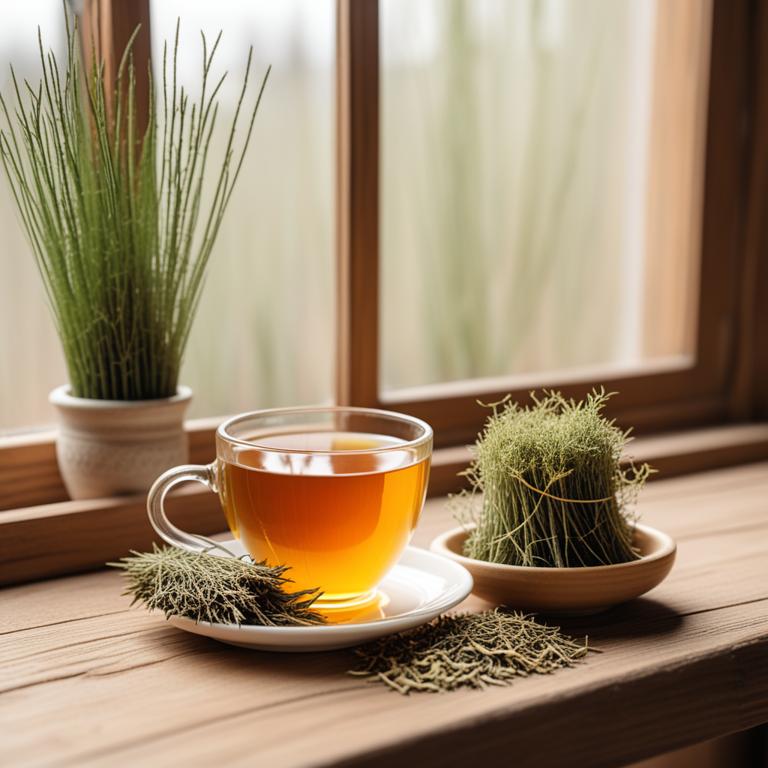
Equisetum arvense teas, also known as horsetail tea, have been traditionally used to treat arthritis due to its anti-inflammatory and analgesic properties.
This herbal preparation helps to treat arthritis by reducing joint pain and swelling, and also by promoting the healing of damaged tissues.
The bioactive constituents of Equisetum arvense tea, including flavonoids, saponins, and silica, contribute to its therapeutic effects, with silica playing a key role in improving joint health and reducing inflammation.
The benefits of using Equisetum arvense tea to treat arthritis include reduced joint pain, improved mobility, and a decrease in the risk of further joint damage.
Recipe:
- Gather 2 cups of fresh Equisetum arvense (horsetail) leaves and stems.
- Wash the horsetail in cold water to remove dirt and impurities.
- Dry the horsetail in a low-temperature oven (150°F - 200°F) for 1-2 hours.
- Steep 1 tablespoon of dried horsetail in 1 cup of boiling water for 5-7 minutes.
- Strain the tea and drink 1 cup, 2-3 times a day, to help manage arthritis symptoms.
Equisetum arvense teas can be beneficial in treating arthritis, but possible side effects include allergic reactions, digestive issues, and interactions with other medications, which can exacerbate the condition.
Precautions to take when using this herbal preparation include starting with small doses, monitoring blood pressure and kidney function, and being aware of potential interactions with other herbal supplements or medications.
7. Rheum rhabarbarum teas
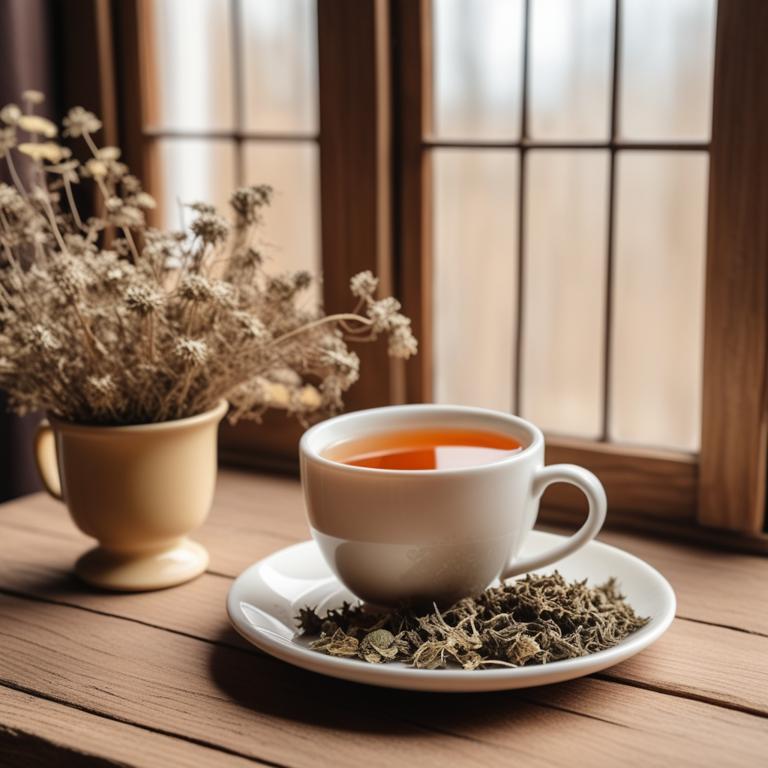
Rheum rhabarbarum teas have been traditionally used to treat arthritis due to their anti-inflammatory and antioxidant properties.
The bioactive constituents of Rheum rhabarbarum, including anthraquinones and flavonoids, help to reduce joint inflammation and alleviate pain associated with arthritis.
By inhibiting the production of pro-inflammatory cytokines and enzymes, Rheum rhabarbarum teas help to relieve arthritis symptoms, promoting joint mobility and comfort.
The benefits of using Rheum rhabarbarum teas to treat arthritis include reduced pain and inflammation, improved joint function, and enhanced overall well-being.
Recipe:
- Gather 1 cup of fresh or dried Rheum rhabarbarum roots, 1 cup of water, and a strainer.
- Cut the roots into small pieces and place them in a saucepan.
- Add 1 cup of water to the saucepan and bring to a boil.
- Reduce heat and let it simmer for 10-15 minutes, then strain the liquid.
- Drink 1/2 cup of the tea 2-3 times a day to help with arthritis symptoms.
Rheum rhabarbarum teas can be used to treat arthritis symptoms, but possible side effects include digestive issues, such as diarrhea and stomach cramps, as well as allergic reactions like hives and itching.
Precautions to take when using Rheum rhabarbarum teas include monitoring your body's reaction and adjusting the dosage, avoiding consumption during pregnancy and breastfeeding, and being cautious when combining with other medications that affect blood pressure or blood sugar levels.
8. Achillea millefolium teas

Achillea millefolium teas, also known as yarrow tea, have been used for centuries to help alleviate the symptoms of arthritis due to their anti-inflammatory and antirheumatic properties.
The bioactive constituents, such as flavonoids, sesquiterpene lactones, and phenolic acids, in this herbal preparation have been shown to inhibit the production of pro-inflammatory enzymes and cytokines, which contribute to the inflammation and pain associated with arthritis.
By consuming Achillea millefolium teas, individuals can experience reduced pain and inflammation, improved joint mobility, and enhanced overall well-being, making it a popular natural remedy for managing arthritis.
The benefits of using Achillea millefolium teas to treat arthritis include a reduction in the need for pharmaceutical medications, a decrease in the risk of side effects, and a natural approach to managing chronic pain and inflammation.
Recipe:
- Gather 1 cup of fresh or dried Achillea millefolium leaves.
- Use 1 tablespoon of the leaves for every 1 cup of boiling water.
- Steep the leaves in boiling water for 5-7 minutes.
- Strain the tea and discard the leaves. Let it cool down.
- Drink 1/2 cup of the tea 2-3 times a day to help with arthritis symptoms.
Achillea millefolium teas can be used as a potential treatment for arthritis, but it may cause side effects such as stomach upset, allergic reactions, and interactions with certain medications, including blood thinners and diabetes medications.
When using Achillea millefolium teas to treat arthritis, it is recommended to start with a small dose and gradually increase as needed, and to avoid taking it with other medications or substances that may interact with its active compounds.
Achillea Millefolium Tea on Amazon
Biokoma Pure and Organic Yarrow Dried Herb 30 Tea Bags 1.5oz In Resealable Moisture Proof Pouch, USDA Certified Organic - Herbal Tea, No Additives, No Preservatives, No GMO, Kosher
Disclaimer: We earn a commission if you click this link and make a purchase at no additional cost to you.
9. Capsicum annuum teas
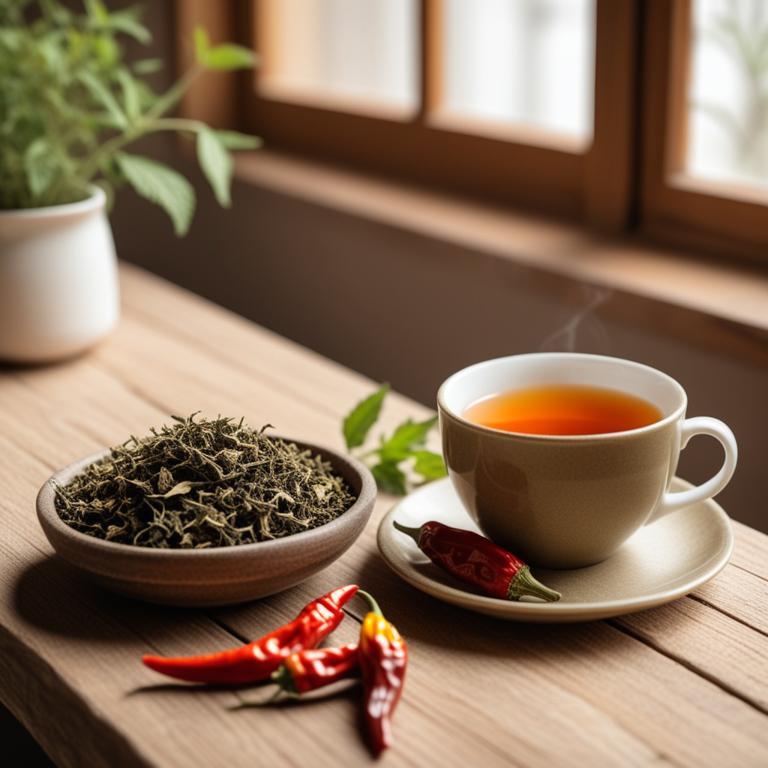
Capsicum annuum teas have been traditionally used to treat arthritis due to their anti-inflammatory and antioxidant properties, which help to reduce joint pain and inflammation.
The bioactive constituents present in these teas, including capsaicin and flavonoids, exert their therapeutic effects by inhibiting the production of pro-inflammatory enzymes and cytokines, thereby alleviating arthritis symptoms.
Capsicum annuum teas have been found to provide relief from arthritis by reducing pain and stiffness, improving joint mobility, and promoting overall well-being.
The benefits of using Capsicum annuum teas to treat arthritis include a reduction in reliance on conventional medications, improved quality of life, and a natural approach to managing the condition.
Related Study
According to "Advances in experimental medicine and biology", Capsicum annuum teas for arthritis have been shown to exhibit analgesic, anti-inflammatory, and apoptotic effects, reducing inflammation and pain in rheumatoid arthritis due to the interaction with the TRPV1 and other cell signalling pathways.
Recipe:
- Gather 1 cup of fresh or dried Capsicum annuum (sweet peppers) and 1 cup of boiling water.
- Crush the Capsicum annuum to release its oils and flavor. You can use a mortar or a coffee grinder for this.
- Add 1 tablespoon of honey (optional) and the crushed Capsicum annuum to the boiling water.
- Let the mixture steep for 5-10 minutes. Strain it using a tea strainer or cheesecloth to remove the solids.
- Drink 1-2 cups of the tea per day, preferably in the morning and evening, to help manage arthritis symptoms.
Capsicum annuum teas can be a potential remedy for arthritis, but its use may be associated with side effects such as stomach upset, diarrhea, and allergic reactions in some individuals.
To use Capsicum annuum teas safely, it is recommended to start with a low dose and gradually increase as needed, and to avoid consuming it on an empty stomach or with other spicy foods to minimize potential irritation.
10. Camellia sinensis teas
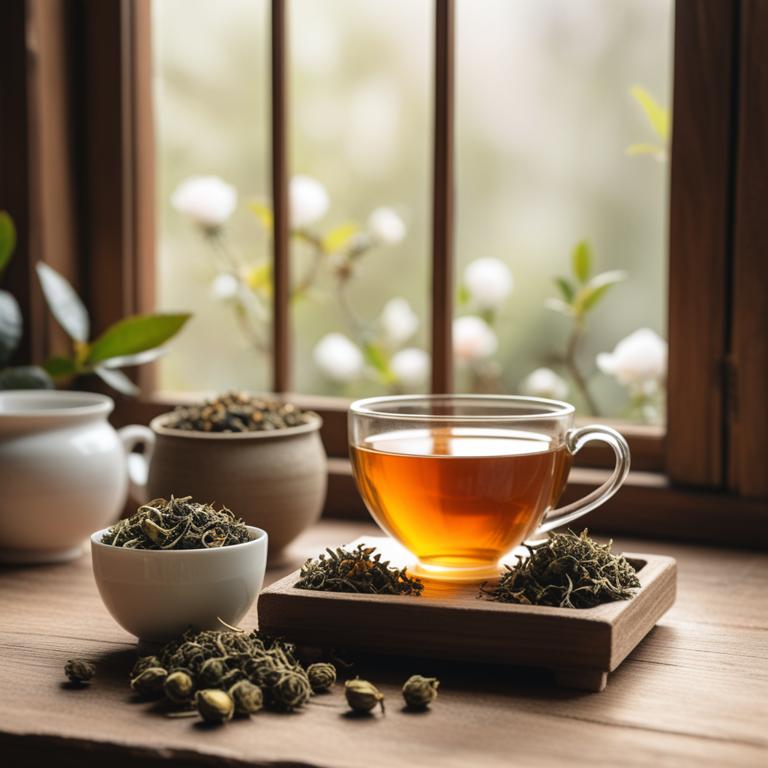
Camellia sinensis teas have been traditionally used to treat arthritis due to their anti-inflammatory and antioxidant properties, which help to reduce joint pain and inflammation.
The herbal preparation's ability to inhibit pro-inflammatory enzymes and cytokines is attributed to its bioactive constituents such as flavonoids and theaflavins, which help to alleviate arthritis symptoms.
Camellia sinensis teas also contain epigallocatechin gallate (EGCG), a polyphenol that has been shown to reduce joint inflammation and improve symptoms of osteoarthritis.
Regular consumption of Camellia sinensis teas has been reported to provide relief from arthritis pain and improve overall quality of life, making it a promising natural remedy for managing this debilitating condition.
Related Study
According to "BMC complementary and alternative medicine", Camellia sinensis teas for arthritis are not mentioned in the provided study, but based on general knowledge, Camellia sinensis (green tea) has been found to have anti-inflammatory properties and may help alleviate symptoms of arthritis due to its antioxidant and anti-inflammatory compounds.
Recipe:
- Gather 1 cup of Camellia sinensis tea leaves (black, green, or white) and 1 cup of boiling water.
- Heat 1 cup of water in a kettle or on the stove until it boils.
- Add 1-2 teaspoons of Camellia sinensis tea leaves to a tea infuser or a heat-resistant cup.
- Pour the boiling water over the tea leaves and let it steep for 3-5 minutes, depending on your desired strength.
- Strain the tea and drink 1-2 cups per day, sweetened with honey if needed, to help with arthritis symptoms.
Camellia sinensis teas can be used to treat arthritis, but it may cause side effects such as gastrointestinal issues, including stomach upset and diarrhea, as well as allergic reactions like skin rashes and itching.
To use Camellia sinensis teas safely, it is essential to start with small amounts, gradually increase the dosage, and avoid consuming it for extended periods, as this may lead to caffeine dependence and interact with other medications.
Camellia Sinensis Tea on Amazon
Ito En Traditional Matcha Green Tea 50 Count Zero Calories, Caffeinated
Disclaimer: We earn a commission if you click this link and make a purchase at no additional cost to you.
11. Boswellia serrata teas
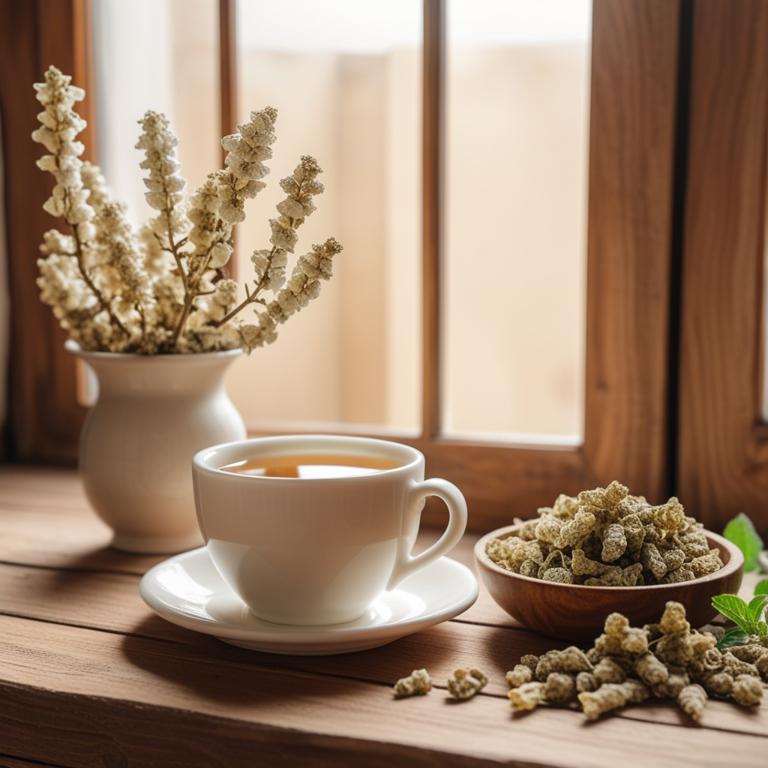
Boswellia serrata teas have been widely used as a natural remedy to treat arthritis, a chronic and inflammatory condition that affects the joints.
The anti-inflammatory and analgesic properties of this herbal preparation help to reduce pain and inflammation in the joints, thereby alleviating the symptoms of arthritis.
The bioactive constituents of Boswellia serrata, including boswellic acids, alpha-pinene, and beta-pinene, are responsible for its therapeutic effects, as they inhibit the production of pro-inflammatory enzymes and block the action of prostaglandins.
Regular consumption of Boswellia serrata teas has been found to improve joint health, reduce stiffness and swelling, and enhance overall quality of life in individuals suffering from arthritis.
Related Study
According to the information, Boswellia serrata teas for arthritis may be a promising alternative for chronic joint inflammatory disorders due to its potential mechanism of action, which is likely to involve the reduction of inflammation and oxidative stress.
Recipe:
- Get 1 teaspoon of Boswellia serrata powder from a trusted source.
- Boil 1 cup of water in a pot.
- Remove the pot from heat and add 1 teaspoon of Boswellia serrata powder.
- Steep the mixture for 5-10 minutes. Strain the liquid using a fine-mesh sieve or cheesecloth.
- Drink the Boswellia serrata tea 2-3 times a day, as needed, for relief from arthritis symptoms.
Boswellia serrata teas can potentially cause side effects such as stomach upset, nausea, and diarrhea in some individuals, particularly when consumed in large amounts or for extended periods.
To minimize potential risks, it is recommended to use Boswellia serrata teas in moderation, avoid consuming them on an empty stomach, and be cautious when combining them with other medications, as they may interact and exacerbate underlying health conditions.
12. Salix alba teas

Salix alba teas have been used for centuries to treat arthritis, a condition characterized by inflammation and pain in the joints.
The anti-inflammatory and analgesic properties of Salix alba teas help to reduce swelling and ease pain, making it an effective remedy for managing arthritis symptoms.
The bioactive constituents, including salicylic acid and flavonoids, work together to inhibit the production of pro-inflammatory enzymes, thereby reducing inflammation and alleviating pain.
As a result, Salix alba teas offer a natural and non-invasive approach to treating arthritis, providing relief from joint pain and inflammation without the side effects associated with conventional medications.
Related Study
According to "Phytotherapy research : PTR", Salix alba teas, which are part of the herbal product Atrisin, showed significant improvement in spontaneous pain and a progressive reduction in functional disability in patients with osteoarthritis and rheumatoid arthritis.
Recipe:
- Gather 2 cups of dried Salix alba bark. You can buy it from a health food store.
- Boil 4 cups of water in a large pot.
- Add 2 tablespoons of dried Salix alba bark to the boiling water.
- Let it steep for 10-15 minutes. Strain the tea with a fine-mesh sieve.
- Drink 1-2 cups of the tea, 2-3 times a day, to help manage arthritis symptoms.
Salix alba teas can provide relief from arthritis symptoms, but its use may be associated with side effects such as stomach upset, nausea, and diarrhea due to its high concentration of salicylic acid.
To minimize potential risks, it is recommended to start with low doses and gradually increase as needed, avoid taking Salix alba teas for extended periods, and be cautious when combining it with other medications that contain salicylates.
13. Hypericum perforatum teas

Hypericum perforatum teas, also known as St. John's Wort, have been traditionally used to treat arthritis due to their anti-inflammatory, antirheumatic, and pain-relieving properties.
The bioactive constituents of this herbal preparation, such as flavonoids, phenolic acids, and terpenoids, help to reduce inflammation and alleviate pain associated with arthritis.
By modulating the immune system and reducing oxidative stress, Hypericum perforatum teas may help to slow down the progression of arthritis and alleviate symptoms such as joint pain and stiffness.
The benefits of using this herbal preparation to treat arthritis include reduced pain and inflammation, improved joint mobility, and enhanced overall quality of life.
Related Study
According to "Life (Basel, Switzerland)", Hypericum perforatum teas for arthritis have not been specifically mentioned in the study, but the study suggests that medicinal plants, including those with anti-inflammatory properties like Hypericum perforatum, could be a powerful source for the development of new remedies for treating inflammation and arthritis.
Recipe:
- Gather 1 cup of fresh Hypericum perforatum leaves, or 2 teaspoons of dried leaves.
- Use a tea infuser or a heat-resistant cup to steep 1 cup of boiling water.
- Add the fresh or dried Hypericum perforatum leaves to the infuser or cup.
- Steep for 5-7 minutes, then strain the tea into a cup.
- Drink 1-2 cups of the Hypericum perforatum tea 2-3 times a day, as needed for arthritis relief.
Hypericum perforatum teas can be used to treat arthritis due to its anti-inflammatory properties, but may cause side effects such as dizziness, stomach upset, and allergic reactions in some individuals.
When using Hypericum perforatum teas to treat arthritis, it is essential to be aware that prolonged use can lead to photosensitivity, and individuals should avoid direct sunlight or use protective measures to prevent skin irritation.
Hypericum Perforatum Tea on Amazon
Horbäach St Johns Wort Tincture | 2 Fl Oz | Alcohol Free | Vegetarian Liquid Extract | Non-GMO, Gluten Free Supplement
Disclaimer: We earn a commission if you click this link and make a purchase at no additional cost to you.